“Jurisdiction of the Law”
The Signs of the Times 12, 5. February 4, 1886
E. J. Waggoner
We have already anticipated this division of the subject, and have shown, by the extent of the gospel commission, that the law of God has been known and transgressed by men in every part of the world; that as the gospel is to be preached in all the world until the coming of Christ, sin will exist just as extensively and just as long; and that, consequently, the law, of which sin is the transgression, will be binding in all the world till the end of time.
We wish, however, to carry the subject a little further.
 The apostle says that “God was in Christ, reconciling the world unto himself,” and that He has committed the carrying on of this work to His ambassadors-the ministers of the gospel-who, in Christ’s stead, pray the world to be reconciled to God. 2 Cor. 5:19, 20.
The apostle says that “God was in Christ, reconciling the world unto himself,” and that He has committed the carrying on of this work to His ambassadors-the ministers of the gospel-who, in Christ’s stead, pray the world to be reconciled to God. 2 Cor. 5:19, 20.
Now, reconciliation implies a previous condition of enmity; and if the world needed reconciling to God, it was because the world was at enmity with God. And since the work of reconciling is still being carried on, it follows that the rebellion, or enmity, still exists. Then the question arises, In what does that enmity consist? The same apostle tells us: “Because the carnal mind is enmity against God; for it is not subject to the law of God, neither indeed can be.” Rom. 8:7.
Men are rebels, because they are in opposition to God’s law. And this is the same truth that had been uttered, centuries before, by the inspired prophet: “Now go, write it before them in a table, and note it in a book, that it may be for the time to come for ever and ever; that this is a rebellious people, lying children, children that will not hear the law of the Lord.” Isa. 30:8, 9.
This brings out again the fact previously stated, that the gospel announces, and carries on its forefront, the law.
It was the transgression of the law that made it necessary for Christ to come to reconcile men to God. And as men, by continued sin, lost their sense of its heinousness, and of their obligation to God, it became more and more necessary that the gospel, in announcing to men the way of pardon and reconciliation, should make known their need of such reconciliation and pardon by setting forth, in plain terms, the law which they had transgressed.
 This is what is plainly stated by Peter, when, after quoting Isaiah’s tribute to the enduring nature of the law, “For all flesh is as grass, and all the glory of man as the flower of grass. The grass withereth, and the flower thereof falleth away; but the word of the Lord endureth forever,” he adds, “And this is the word which by the gospel is preached unto you.” 1 Peter 1:24, 25.
This is what is plainly stated by Peter, when, after quoting Isaiah’s tribute to the enduring nature of the law, “For all flesh is as grass, and all the glory of man as the flower of grass. The grass withereth, and the flower thereof falleth away; but the word of the Lord endureth forever,” he adds, “And this is the word which by the gospel is preached unto you.” 1 Peter 1:24, 25.
The quotations made from John Wesley and Bishop Simpson are in harmony with this conclusion. Indeed, the conclusion is so nearly self-evident that it must be reached by all thoughtful, candid minds. The very fact that a pardon is granted, attests the authority of the law; and before a pardon can be granted, the individual must know and acknowledge his guilt. If a man thinks himself righteous, he will indignantly spurn any offer of pardon, even though he may really stand in need of it.
Human nature would leave such to the fate which their own blindness and stubbornness deserve; but God loves the world, and desires that all men shall accept his pardon, and thus be reconciled to Him; and therefore He takes pains to bring men to a sense of their sinful condition, so that the pardon which He offers may be accepted. The same messenger who is commissioned to announce the pardon, proclaims the law of God, which awakens the self-confident sinner, so that he may appreciate his lost condition.
Let us look still further into the matter of the extent of the law’s jurisdiction.
Read Rom. 3:19:
“Now we know that what things soever the law saith, it saith to them who are under the law: that every mouth may be stopped, and all the world may become guilty before God.”
The law speaks only to those who are within the bounds of its jurisdiction; it cannot condemn any who may walk contrary to its provisions, if they are outside of its limits. For example, a man in Russia may commit an act which is forbidden by the laws of the United States; yet he cannot on that account be declared guilty, simply because the United States law has no jurisdiction in his case. He is not amenable to it. But as a consequence of what the law of God says, all the world are found guilty before Him.
This, again, shows conclusively that all the world are in duty, bound to keep God’s law.
There are no exceptions to this fact. We have before learned that “sin is the transgression of the law” (1 John 3:4) and that “where no law is, there is no transgression” (Rom. 4:15); and therefore we know that wherever we find sin, there must also be the law. To whomsoever sin is imputed, upon him the law has claims; for “sin is not imputed when there is no law.” Rom. 5:13.
Now we find these statements in the third of Romans: “What then? Are we better than they? No, in no wise; for we have before proved both Jews and Gentiles, that they are all under sin; as it is written, There is none righteous, no, not one;” “For all have sinned, and come short of the glory of God.” Verses 9, 10, 23.
Here the apostle descends to particulars, and shows that not to the Jews alone, but to Gentiles as well, is sin imputed, thus proving beyond all controversy that the Gentiles as well as the Jews are under the jurisdiction of the law of God, and have violated it. Our investigation of the law began with the time when it was given on Mount Sinai; and we must therefore now examine to see if that was the first of its existence.
 And here, as in all our study of the law, we find help from our knowledge of the fact that the law is “the righteousness of God.” Then it must necessarily have been in existence before the exode. Since it is a transcript of God’s character, it necessarily follows that its existence is coeval with the existence of God. “But,” it may be objected, “the law, as a manifestation of God’s righteousness, might exist, without being transcribed for the government of mankind.”
And here, as in all our study of the law, we find help from our knowledge of the fact that the law is “the righteousness of God.” Then it must necessarily have been in existence before the exode. Since it is a transcript of God’s character, it necessarily follows that its existence is coeval with the existence of God. “But,” it may be objected, “the law, as a manifestation of God’s righteousness, might exist, without being transcribed for the government of mankind.”
So it might if there were no creatures to whom it could be made known; or if there was any time after creatures had been brought into existence when God did not exercise government over them. But it is not for us to speculate on the state of affairs when God dwelt alone, inhabiting His own eternity, before the existence even of the “sons of God” that shouted for joy at the creation of this earth; and there certainly has never been a time since intelligent creatures were formed, either in Heaven or on earth, when God was not supreme ruler.
No created beings have ever been independent of His control. But if God has always been ruler, He must have had some rule of government, and that could be nothing else than His righteousness-His law. The Ten Commandments are righteousness; they are perfect, holy, just, and good, and therefore exactly fitted to be the rule of a righteous and just government. Then, from the very nature of the law we would conclude that it was binding on men before it was spoken from Mount Sinai.
We shall shortly recur to the argument broached in this paragraph; but first, we wish to show from positive evidence that the law of Ten Commandments was known by men, and was binding on them, before the giving of it on Sinai.
In Rom. 5:12, we read that:-
“by one man sin entered into the world, and death by sin; and so death passed upon all men, for that all have sinned.”
Here the apostle shows that death is a consequence of sin; death came into the world because there was sin in the world. If there had been no sin, there would have been no death, and wherever death is found, it is positive evidence that sin exists.
With this passage, we may well place 1 Cor. 15:56:
“The sting of death is sin; and the strength of sin is the law.”
Here death is represented as a cruel monster that has brought many people into its power. It has poisonous fangs with which it strikes its victims, and these fangs, this sting, is sin. Let the fangs be drawn,-let sin be obliterated,-and death’s power would be gone. But the “strength of sin is the law.” “Sin is the transgression of the law,” and it is the violated law which provides death with its powerful sting. Were it not for the law, death would have no sting, that is, it would be powerless to destroy. So here, again, we have proof that wherever death is, there is the law also.
We read on:
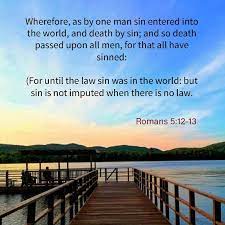 “For until the law sin was in the world: but sin is not imputed when there is no law. Nevertheless death reigned from Adam to Moses, even over them that had not sinned after the similitude of Adam’s transgression, who is the figure of him that was to come.” Rom. 5:13, 14.
“For until the law sin was in the world: but sin is not imputed when there is no law. Nevertheless death reigned from Adam to Moses, even over them that had not sinned after the similitude of Adam’s transgression, who is the figure of him that was to come.” Rom. 5:13, 14.
Here we have the statement that until the law, that is, until the time of Moses, when it was spoken from Sinai, sin and death were in the world; therefore we know that the law was in the world. And hereby we know that the expression, “until the law,” does not indicate that the time so specified was the first existence of the law; for both sin and death were in the world before that time, and neither can exist without the law, and the law violated.
Let us go still further into particulars.
“Sin is the transgression of the law” (1 John 3:4), and “sin is not imputed when there is no law.” Rom. 5:13. But sin was imputed to Cain (Gen. 4:7, 8), and consequently the law was there to condemn. Turn to the commandments, and you will find that the sixth commandment was the one especially transgressed.
Again we read that “the men of Sodom were wicked and sinners before the Lord exceedingly.” Gen. 13:13. “Sin is not imputed when there is no law,” and consequently we know that God judged the Sodomites by His law.
If He judged them by His law, of course they knew of the existence of that law; otherwise, their punishment would not have been just; but we may be sure that the “Judge of all the earth” will do right. Take the case of the sons of Noah (Gen. 9:22-26). Here we have direct evidence that the fifth commandment was known; that it was violated by Ham, the younger son of Noah, and kept by the other two; and that the one was cursed for his sin, while the others were blessed for their observance of the commandment.
These things show the existence of that commandment, a knowledge of its existence, and also a knowledge that it was in full force to condemn the guilty and to acquit the innocent. We find also the violation of the eighth commandment mentioned in Gen. 31:30. It is not necessary to particularize concerning each of the commandments, but we will notice one more.
In Gen. 15:15, 16, we read these words of the Lord to Abraham:
“And thou shalt go to thy fathers in peace; thou shalt be buried in a good old age. But in the fourth generation they shall come hither again; for the iniquity of the Amorites is not yet full.”
This shows that in the days of Abraham, the inhabitants of Canaan, the Gentiles, were guilty of iniquity. Iniquity is sin, and “sin is the transgression of the law;” so, therefore, the Amorites had the law of God.
Turn now to 1 Kings 21:25, 26, and you will learn of what the Amorites were guilty:-
“But there was none like unto Ahab, which did sell himself to work wickedness in the sight of the Lord, whom Jezebel his wife stirred up. And he did very abominably in following idols, according to all things as did the Amorites, whom the Lord cast out before the children of Israel.”
Here we find that the Amorites were cast out of Canaan because of idolatry,- idolatry, which, in its rites, involved the violation of not only the first and second commandments, but of all the ten. So we find that all the commandments were known and violated hundreds of years before the Jews came to Mount Sinai, and before there ever was a Jew. The point has now been proved, both from the nature of the law and by actual illustrations of the fact. E. J. W. (To be continued.)
“Jurisdiction of the Law. ( Continued )”
The Signs of the Times 12, 6. February 11, 1886
E. J. Waggoner
Thus far we have shown the existence of the law of God from the earliest history of mankind.
We wish now to carry the argument a step further, as we have already intimated that we should do. We have found the law to be “the righteousness of God,” the rule of His government. Since God has always been supreme ruler, and His rule has always been just and righteous, He must have judged only by His own righteous character, which is embodied in the Decalogue.
Now God has created many worlds besides this one (Heb. 1:2), and since He formed ours that it might be inhabited (Isa. 45:18), the conclusion is legitimate, in the absence of any evidence to the contrary, that He made the others for the same purpose.
 No thinking person can suppose that this little earth, one of the smallest among the innumerable planets of the universe, is the only one that is inhabited. Now of all these vast worlds, God is the King. “The Lord hath prepared his throne in the Heavens; and his kingdom ruleth over all.” Ps. 103:19. And since He can rule by naught except justice and righteousness, and all righteousness, even the righteousness of God Himself, is comprised within the Ten Commandments, it follows that they, and they alone, form the rule of action in all God’s universe.
No thinking person can suppose that this little earth, one of the smallest among the innumerable planets of the universe, is the only one that is inhabited. Now of all these vast worlds, God is the King. “The Lord hath prepared his throne in the Heavens; and his kingdom ruleth over all.” Ps. 103:19. And since He can rule by naught except justice and righteousness, and all righteousness, even the righteousness of God Himself, is comprised within the Ten Commandments, it follows that they, and they alone, form the rule of action in all God’s universe.
Of the correctness of this conclusion we have direct evidence in Ps. 103:20, where we read that the angels “do his commandments, hearkening unto the voice of his word.” If the commandments are the rule in Heaven, where God Himself resides, certainly they are the rule “in all places of his dominion.”
This view of the law, and we are confident that it is a just view, lifts the law question far, far above the plane on which its opposers would fain confine it. Instead of being imperfect and not calculated to bring man into proper relation to his Maker, it is the righteousness of God; instead of being confined to a small portion of this earth, the bounds of its jurisdiction are as extensive as the universe; instead of being given to one nation of earth, and to that alone, it is that to which all loyal creatures, even the angels of Heaven, bow in humble allegiance; and instead of being limited to a few centuries of existence, it “stands fast forever and ever,” even as long as God exists and His kingdom ruleth over all.
We are aware that at first sight many will think that this is going too far, and will possibly raise objections, and say that when we consider the nature of certain commandments, it is not reasonable to suppose that they could be in Heaven for the restraint of heavenly beings. We will therefore add one or two more points.
But first we would remark that when a case is supported by positive evidence, we are not at liberty to reject it because there are points about it which we do not understand. Nothing can be proved so clearly that no one can raise an objection, or even frame an argument, against it; and many things that are susceptible of the clearest proof, cannot be fully comprehended even by those who present the proof.
Take, for instance, the question of the existence of God. Both nature and revelation plainly teach that there is a God, who has existed from eternity; yet it is impossible to state the case so clearly that no one can cavil or raise objections; and there is no one, no matter how clearly he can demonstrate that there is a God, who can comprehend Him, or understand how He could exist from eternity.
The argument from ignorance is no argument at all. Truth is truth, however great our ignorance of it may be. The merchant sitting in his office can put a question to his agent a thousand miles distant, and receive a reply the next minute. Tell this well-known fact to a savage, and he will not believe you; he cannot comprehend how such a thing can be done, and will present objections and arguments which, to his mind, show the utter impossibility of such a thing. Yet in spite of his ignorance, the thing is true. So there are many things in connection with God and His government which finite wisdom cannot explain, but which we must accept.
Now to further show the reasonableness, nay, the absolute necessity, of the Ten Commandments existing as a rule for all creatures of the universe,
 1. “The law of the Lord is perfect.” Ps. 19:7. Since it is perfect, nothing can be added to it or taken from it without making it imperfect. If, then, any creatures should be governed by more or less than this law, they would be governed by an imperfect law. But that, of course, would result in imperfect characters, and would further show the lawgiver to be imperfect; therefore such an idea cannot be entertained.
1. “The law of the Lord is perfect.” Ps. 19:7. Since it is perfect, nothing can be added to it or taken from it without making it imperfect. If, then, any creatures should be governed by more or less than this law, they would be governed by an imperfect law. But that, of course, would result in imperfect characters, and would further show the lawgiver to be imperfect; therefore such an idea cannot be entertained.
- “The law of the Lord is perfect,” because it is a transcript of His will,-His righteousness. Therefore all intelligent creatures must be governed by it. This has already been stated, but it will bear repetition. Too much stress cannot be laid upon it. Wherever God rules, His will must of necessity be law. That the Ten Commandment law, the law out of which the Jews were instructed, is the will of God, Paul shows in Rom. 2:17, 18: “Behold, thou art called a Jew, and restest in the law, and makest thy boast of God, And knowest his will, and approvest the things that are more excellent [margin, triest the things that differ], being instructed out of the law.” That the ten commandments are here referred to, may be seen from verses 21-23. Paul, therefore, speaking to a Jew, said, You know the will of God, because you are instructed out of the law. No further evidence is needed to show that the Ten Commandments are the will of God. Now, since all intelligent creatures must be governed by the will of God, it is evident that they are governed by the Ten Commandments, unless it could be shown that God changes, having one will at one time and toward one people, and another will at another time and for another people. But this cannot be; for “with him is no variableness, neither shadow of turning.” James 1:17. There is, then, one law for all.
-
There are none who can have a greater interest than the righteous whether of the redeemed or of those who never sinned, in having the Ten Commandments maintained as the standard of right. And this for the very reason that it is the standard of right. It is the badge of their loyalty. If there were a place where the Ten Commandments were not held as the law, the righteous ones would not want to go there; for there would be nothing to show that they were righteous. But enough has been said to prove beyond a reasonable doubt the universality of God’s holy law. In all places of God’s dominion, rational beings are by this law either justified or condemned. E. J. W. (To be continued.)
“Jurisdiction of the Law. ( Continued ).”
The Signs of the Times 12, 7. February 18, 1886
E. J. Waggoner
(Continued).
While we have been making the claim and proving it, that the law of God covers every possible act or thought, and that no responsible being is outside of its jurisdiction, some one has been looking for the verse which says that the Gentiles do not have the law, but are a law unto themselves.
Perhaps this is as good a time as any to consider that text.
An answer to it will also involve the consideration of the question why the Ten Commandments, since they have such universal jurisdiction, were spoken from Mount Sinai only to the Jews.
Let us now read the passage above referred to.
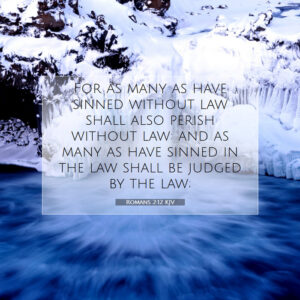 “For as many as have sinned without law shall also perish without law: and as many as have sinned in the law shall be judged by the law; (for not the hearers of the law are just before God, but the doers of the law shall be justified. For when the Gentiles, which have not the law, do by nature the things contained in the law, these, having not the law, are a law unto themselves; which show the work of the law written in their hearts, their conscience also bearing witness, and their thoughts the mean while accusing or else excusing one another.)” Rom. 2:12-15.
“For as many as have sinned without law shall also perish without law: and as many as have sinned in the law shall be judged by the law; (for not the hearers of the law are just before God, but the doers of the law shall be justified. For when the Gentiles, which have not the law, do by nature the things contained in the law, these, having not the law, are a law unto themselves; which show the work of the law written in their hearts, their conscience also bearing witness, and their thoughts the mean while accusing or else excusing one another.)” Rom. 2:12-15.
A brief examination of Paul’s argument in this chapter will be necessary in order to get a proper understanding of this text.
It will be noticed that the 13th, 14th, and 15th verses are parenthetical, and are therefore secondary to the main argument. Therefore in stating the argument, we shall omit those three verses. In the first chapter of Romans, Paul has shown the terribly immoral condition of the heathen world; and in the second chapter he proceeds to show that whoever condemns the heathen, condemns himself; for all are guilty.
God, he says, “will render to every man according to his deeds.” To those who patiently persevere in well-doing, He will render eternal life; but to those who are contentious, and do not obey the truth (see Ps. 119:142), He will render indignation and wrath. And these rewards of good or ill will be rendered to every man, whether he be Jew or Gentile.
“For there is no respect of persons with God. For as many as have sinned without law shall also perish without law; and as many as have sinned in the law shall be judged by the law; in the day when God shall judge the secrets of men by Jesus Christ according to my gospel.”
In the first two chapters of Romans, the apostle brings out the fact which is plainly stated in the third, that “both Jews and Gentiles” are “under sin,” and that “there is none righteous, no, not one.”
In the passage under consideration, he states that, as a consequence, all who do not repent shall suffer “the righteous judgment of God, who will render to every man according to his deeds.” This will be done without regard to nationality; “for there is no respect of persons with God;” that is, it is not a man’s birth, but his character, that gives him favor with God.
It is the doers of the law whom He justifies, whether they be Jews or Gentiles, and not those who, as did many of the Jews, hear the law, but do not obey. All who sin, whether with the law or without it, shall perish. In the 12th and 14th verses, we have the two classes brought to view-those who have the law, and those who have it not.
There is no question but that the Jews had the law; they rested in it (Rom. 2:17), and by breaking it dishonored God. Verses 23, 24. And the 14th verse tells us plainly that those not having the law are the Gentiles. Before considering their case, we must not fail to note the fact that both the Jews who had the law, and the Gentiles who had it not, had sinned. They were alike guilty before God. Rom. 3:9, 10.
Now “sin is the transgression of the law” (1 John 3:4), and “where no law is, there is no transgression.” Rom. 4:15. Therefore it is beyond controversy that both classes here mentioned had transgressed law, and more than that, had been conscious of the fact; for “sin is not imputed when there is no law.”
So it is certain that the Gentiles had transgressed the law; yet the text says they had not the law, and that they “sinned without law.”
How shall we explain this seeming contradiction?
Let us see. Read again verses 14, 15:-
“For when the Gentiles, which have not the law, do by nature the things contained in the law, these, having not the law, are a law unto themselves; which show the work of the law written in their hearts, their conscience also bearing witness, and their thoughts the mean while accusing or else excusing one another.”
When God made man in His own image, He made him upright. Eccl. 7:29. Not alone in his physical form, but also in his moral nature, he was in the image of God. While Adam continued in this upright, sinless condition, the law of God was in his heart. We know this from Ps. 40:8, where David, speaking for the Messiah, says, “I delight to do thy will, O my God; yea, thy law is within my heart.”
The existence of the law of God in the heart is manifested by the willingness to obey that law; and he who, as was the case with Christ, has the law perfectly formed within his heart, will render perfect obedience to the law. This was the case with our first parents in the Garden of Eden. But man fell from his high estate; he sinned against God, and thus marred the perfect copy of the law which had existed in his heart.
The tendency of sin is to multiply itself; like the tares sown among the good grain, it will grow without any attention. So the first sin prepared the way for many more, till at last nearly all the world became wholly given up to sin.
In Heb. 3:13, the apostle says that men become “hardened through the deceitfulness of sin;” that is, the more men sin, the less heinous does sin appear to them, until at last evil appears to be only good, and good evil, and they sin without the slightest compunction of conscience. This principle is something with which everybody is familiar. Now this progressive love of sin, and the indifference to it, is nothing else than the obliterating of the copy of the law which exists in a more or less perfect state in every heart. This work is not done instantaneously; it takes time for men to so completely obliterate the law from their hearts that they will feel no restraint. But when it is entirely gone, then man is in the condition in which he was just prior to the flood, when “every imagination of the thoughts of his heart was only evil continually.” Gen. 6:5.
So long, however, as any portion remains in the heart, the Spirit is enabled to strive with man, and, by means of that law, to convict of sin; and this whether the individual knows anything of the written revelation or not. Now the Gentiles did not have the law written on stone and in books, as did the Jews; they only had that portion which still remained unobliterated from their hearts. Of course the Jews, having much more light than the Gentiles had, were far more responsible.
The former would necessarily be judged by the fullness of the law; for they could not plead ignorance of any portion of it. If they sinned, justice required that the condemnation of the law should be visited upon them in full measure. But the Gentiles could be judged only by the light that they had. Since they had not the written revelation, that, of course, would not be brought up against them. They knew, however, the difference, in many things, between right and wrong; and by this they are judged. Had they lived fully up to the light which they had by nature, they would have been counted as doers of the law; but since they did not, since their own conscience condemned them, they must suffer the consequences.
The Jews, having the written law, are judged by the law; and the Gentiles, not having the written law, perish without being brought into Judgment by it. Perhaps this can be made plainer by illustration.
The Jews had every one of the Ten Commandments in such shape that they could constantly be reminded of them, and know the extent of their claims. Now when they came into Judgment, it is no more than justice that the whole law should be held up before them, that the enormity of their guilt may be manifest. But here is a poor, ignorant barbarian, who, we will suppose, knew by the light of nature, only two precepts of the law,- that it is wrong to kill and to commit adultery. His knowledge of the sinfulness of those acts is shown by his trying to conceal the fact when he has done one or the other of them. His own conscience accuses him. Now it is not necessary, in order to convict him of sin, that the whole ten commandments be held up beside the record of his life. In the Judgment let the two precepts with which he was familiar be recalled to his mind. By these alone he stands condemned as a sinner; and since “the wages of sin is death,” he justly perishes, without ever having seen the written law.
Thus we see that all men, whatever their condition, are amenable to, and are to be judged by, the law of God. When Paul says that the Gentiles have not the law, he means that they had not the written revelation, but not that they did not have some knowledge of right and wrong, as defined by the moral law. E. J. W. (To be continued.)
“Jurisdiction of the Law. Why the Law Was Spoken Only to the Jews
( Concluded )”
The Signs of the Times 12, 8. February 25, 1886
E. J. Waggoner
Now why was it that only the Jews had the written law?
Did the giving of the law to them indicate partiality on the part of God?
Not by any means: “For there is no respect of persons with God.” Before the exode, all the world was on a level, so far as written revelation was concerned. When sin separated man from God so that he could no longer talk with Him face to face, then God supplemented the light which men had in their own hearts, by communicating with them in visions and dreams given to His prophets (Num. 12:6), and by sending angels to them. Gen. 22:15.
Had all men hearkened to the voice of conscience, the communication thus opened between God and man would have been sufficient to bring them at last to the state where the law would be perfectly restored in their hearts. This is that which God is still striving to accomplish. Heb. 8:10.
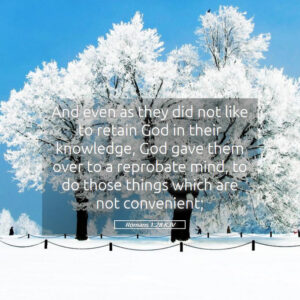 But men did not care to follow even that portion of the law which they retained in their hearts, and consequently God could not send them more light through His prophets. Thus “as they did not like to retain God in their knowledge, God gave them over to a mind void of judgment.” Rom. 1:28.
But men did not care to follow even that portion of the law which they retained in their hearts, and consequently God could not send them more light through His prophets. Thus “as they did not like to retain God in their knowledge, God gave them over to a mind void of judgment.” Rom. 1:28.
In process of time, only one family retained the knowledge of God, and all the rest of the world were destroyed for their abominable wickedness.
Within four hundred years after the flood, men had again corrupted their way on the earth, and only Abraham remained loyal to God. He kept God’s commandments (Gen. 26:5), and had the determination to command his children and his household after him, that they should keep the way of the Lord, to do justice and judgment. Gen. 18:19.
In order that the descendants of Abraham might retain the knowledge of God, God called Abraham away from his corrupt associates, and gave him the rite of circumcision, in order that the separation might be complete. This rite was not designed to be a mark of birth or nationality, but simply as a means of keeping the observers of God’s law from the contaminating influence of those who did not regard it; for whenever one of any other nation became willing to separate from his people and keep the law, he also became circumcised. Gen. 17:12.
This precaution served to keep the descendants of Abraham a distinct people through all their wanderings, and to preserve among them the knowledge of the true God.
Some from other tribes, getting the light from them, would occasionally turn to the Lord, to keep His commandments, and, becoming circumcised, would be counted as the descendants of righteous Abraham; but the great mass of the world chose to remain in the darkness of heathenism.
Thus it happened that when the Lord brought His people from Egyptian bondage, they alone of all the people in the world had a knowledge of God. All the rest could say with Pharaoh, “I know not the Lord.” At that time the Lord chose to give mankind His law in a manner so plain that it could not possibly be mistaken, and so that they could always meditate in it, in its perfection, even though no prophet were at hand.
By this means, the Spirit could make greater progress, so to speak, in writing the law in their hearts. But to whom could He speak the law? Only to those who knew Him, and would accept the law as coming from Him. Therefore He was compelled to give the written law to the Jews, and make them light-bearers to the world.
The law, when it entered, came to the Jews, not because it was designed for them alone, but because they alone would receive it.
 As a further evidence that God was not moved by race considerations, and did not give the law exclusively to the Jews as a nation, we may notice the fact that when the Jews left Egypt, “a mixed multitude went up also with them.” Ex. 12:38; Num. 11:4.
As a further evidence that God was not moved by race considerations, and did not give the law exclusively to the Jews as a nation, we may notice the fact that when the Jews left Egypt, “a mixed multitude went up also with them.” Ex. 12:38; Num. 11:4.
This “mixed multitude” was composed of Egyptians, and, no doubt, of people of other nationalities. These went along with the Jews, and with them received the law from God at Mount Sinai. We cannot close this portion of our subject without giving, from the pen of another, the following graphic portrayal of the condition of a people who should have no regard for the law of God:-
“No error accepted by the Christian world strikes more boldly against the authority of Heaven, none is more directly opposed to the dictates of reason, none is more pernicious in its results, than the modern doctrine, so rapidly gaining ground, that God’s law is no longer binding upon men.
Every nation has its laws, which command respect and obedience; no government could exist without them; and can it be conceived that the Creator of the heavens and the earth has no law to govern the beings He has made? Suppose that prominent ministers were publicly to teach that the statutes which govern their land and protect the rights of its citizens were not obligatory-that they restricted the liberties of the people, and therefore ought not to be obeyed; how long would such men be tolerated in the pulpit?
But is it a graver offense to disregard the laws of states and nations than to trample upon those divine precepts which are the foundation of all government? It would be far more consistent for nations to abolish their statutes, and permit the people to do as they please, than for the Ruler of the universe to annul His law, and leave the world without a standard to condemn the guilty or justify the obedient.
Would we know the result of making void the law of God?
The experiment has been tried. Terrible were the scenes enacted in France when atheism became the controlling power. It was then demonstrated to the world that to throw off the restraints which God has imposed is to accept the rule of the cruelest of tyrants. When the standard of righteousness is set aside, the way is open for the prince of evil to establish his power in the earth.
Wherever the divine precepts are rejected, sin ceases to appear sinful or righteousness desirable. Those who refuse to submit to the government of God are wholly unfitted to govern themselves. Through their pernicious teachings the spirit of insubordination is implanted in the hearts of children and youth, who are naturally impatient of control; and a lawless, licentious state of society results. While scoffing at the credulity of those who obey the requirements of God, the multitudes eagerly accept the delusions of Satan. They give the rein to lust and practice the sins which have called down judgments upon the heathen.
Let the restraint imposed by the divine law be wholly removed, and human laws would soon be disregarded. Because God forbids dishonest practices,- coveting, lying, and defrauding,-men are ready to trample upon His statutes as a hindrance to their worldly prosperity; but the results of banishing these precepts would be such as they do not anticipate. If the law were not binding, why should any fear to transgress? Property would no longer be safe. Men would obtain their neighbors’ possessions by violence, and the strongest would become richest. Life itself would not be respected.
Those who disregard the commandments of God sow disobedience to reap disobedience.
The marriage vow would no longer stand as a sacred bulwark to protect the family. He who had the power, would, if he desired, take his neighbor’s wife by violence. The fifth commandment would be set aside with the fourth. Children would not shrink from taking the life of their parents, if by so doing they could obtain the desire of their corrupt hearts. The civilized world would become a horde of robbers and assassins; and peace, rest and happiness would be banished from the earth.”-Mrs. E. G. White, in “Great Controversy,” vol. 4, chap. 51.
This is just the state of things that would exist, not only in this world, but in all the universe, if the Ten Commandments were not the universal rule of action. If there be any portion of the universe where the decalogue is not the recognized law, the above paragraphs accurately describe the condition of its society. E. J. W.

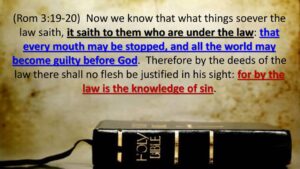
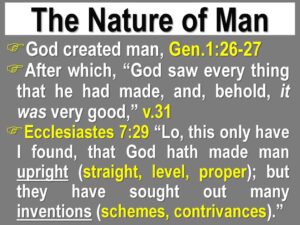





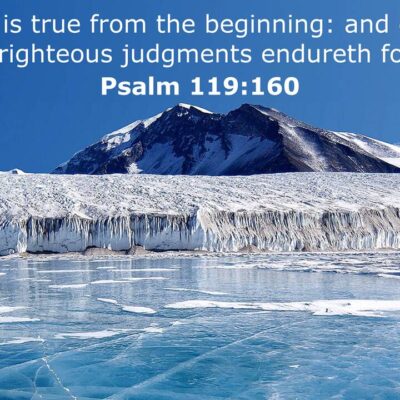



 In Chapter Four of Love Wins, Bell criticizes some statements of faith that he has taken from evangelical church websites that reflect Jesus’ teachings on Hell: “The unsaved will be separated forever from God in hell.” After giving a number of examples with which he feels uncomfortable, Bells states,
In Chapter Four of Love Wins, Bell criticizes some statements of faith that he has taken from evangelical church websites that reflect Jesus’ teachings on Hell: “The unsaved will be separated forever from God in hell.” After giving a number of examples with which he feels uncomfortable, Bells states, 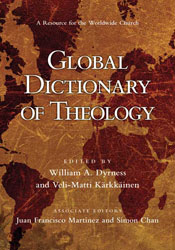 The emergent-friendly, Global Dictionary of Theology, makes a distinction between ‘Hopeful Universalism’ and ‘Convinced Universalism’:
The emergent-friendly, Global Dictionary of Theology, makes a distinction between ‘Hopeful Universalism’ and ‘Convinced Universalism’: Indeed, in the very preface of Love Wins, Bell contradicts Jesus’ teaching that few would actually be saved. Bell writes:
Indeed, in the very preface of Love Wins, Bell contradicts Jesus’ teaching that few would actually be saved. Bell writes: It is a sobering thought that Jesus went on to state in the verses immediately following His teaching on the narrow and broad roads, that false prophets would come in sheep’s clothing (Matthew 7:15-21). Such false prophets stand at the cross roads between the broad and narrow road, claiming to represent Christ, while pointing their followers toward the broad road that leads destruction, assuring them that it eventually leads to Heaven. Consider this for a minute. Isn’t this exactly what Rob Bell is doing?
It is a sobering thought that Jesus went on to state in the verses immediately following His teaching on the narrow and broad roads, that false prophets would come in sheep’s clothing (Matthew 7:15-21). Such false prophets stand at the cross roads between the broad and narrow road, claiming to represent Christ, while pointing their followers toward the broad road that leads destruction, assuring them that it eventually leads to Heaven. Consider this for a minute. Isn’t this exactly what Rob Bell is doing? Rob Bell not only redefines Hell by teaching that it will only be a temporary abode for those who want to leave later, but he redefines Hell by claiming that it is not so much about the after life, but it’s about what you make of the life here and now. In his book, Velvet Elvis, Bell had already stated this position:
Rob Bell not only redefines Hell by teaching that it will only be a temporary abode for those who want to leave later, but he redefines Hell by claiming that it is not so much about the after life, but it’s about what you make of the life here and now. In his book, Velvet Elvis, Bell had already stated this position: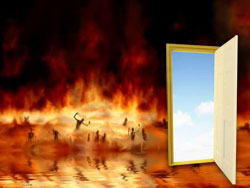 Rob Bell takes every possible liberty to deny reality and to either explain Hell away or get everyone into Heaven, regardless of his or her rejection of God and the Gospel. Bell not only empties Hell of God’s holy wrath, he creates an exit door from the inside out and claims that Hell is merely what we make it. He also claims that most of the imagery of future judgments in Hell were fulfilled on earth in AD 70 (p. 81).
Rob Bell takes every possible liberty to deny reality and to either explain Hell away or get everyone into Heaven, regardless of his or her rejection of God and the Gospel. Bell not only empties Hell of God’s holy wrath, he creates an exit door from the inside out and claims that Hell is merely what we make it. He also claims that most of the imagery of future judgments in Hell were fulfilled on earth in AD 70 (p. 81).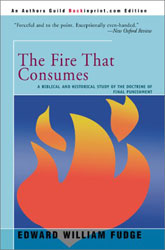 By claiming that the unrepentant wicked will have a chance to get to Heaven from Hell, Rob Bell has gone beyond that of Edward W. Fudge, who states in The Fire That Consumes,
By claiming that the unrepentant wicked will have a chance to get to Heaven from Hell, Rob Bell has gone beyond that of Edward W. Fudge, who states in The Fire That Consumes, 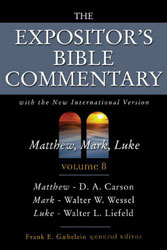 Biblical Scholar D.A. Carson, commenting on Matthew 25:46, says :
Biblical Scholar D.A. Carson, commenting on Matthew 25:46, says :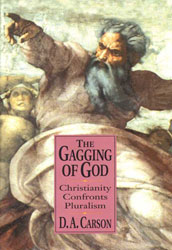 “What is hard to prove, but seems to me probable, is that one reason why the conscious punishment of hell is ongoing is because sin is ongoing.”
“What is hard to prove, but seems to me probable, is that one reason why the conscious punishment of hell is ongoing is because sin is ongoing.”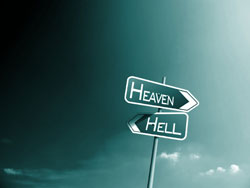 There is hardly any wiggle room for a second chance in hell in these passages or anywhere in Scripture. Bell would have his readers believe of the book of Revelation that
There is hardly any wiggle room for a second chance in hell in these passages or anywhere in Scripture. Bell would have his readers believe of the book of Revelation that  May God give us the grace, in these times of apostasy, to hold fast to Jesus’ teachings and remain faithful to our loving and Holy Lord to the end. May God deliver His bride from the cotton candy Christianity that is endemic in Emergent Churches and among false prophets who lead the lost into believing they can put off repentance until after death.
May God give us the grace, in these times of apostasy, to hold fast to Jesus’ teachings and remain faithful to our loving and Holy Lord to the end. May God deliver His bride from the cotton candy Christianity that is endemic in Emergent Churches and among false prophets who lead the lost into believing they can put off repentance until after death.
Leave a Reply